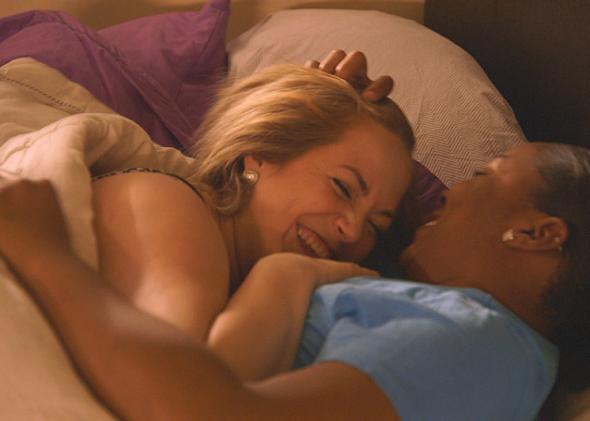On Friday night, Showtime is airing a fantastic documentary with a terrible title. It’s too bad that a powerful film about the pernicious, damaging influence of organized religion on the lives of some strong, likable, down-to-earth lesbians from the American South should be saddled with the name L Word Mississippi: Hate the Sin. But try to look past it. The women in the movie have almost nothing in common with the glamorous L.A. lesbians of The L Word or the spoiled, rage-prone coastal lesbians of The Real L Word. Forget those pre-existing franchises and focus on these women, because they are delightful, inspirational, and in at least one case, heartbreakingly messed-up.
Even before the credits roll, it’s clear we’re not in La La Land anymore. Mississippi is different from Los Angeles, apparently: In the Magnolia State, making out in public is out of the question. “It’s not cool to go out and be gay,” declares Jana, a young woman who seems more mature than the entire cast of The Real L Word combined. “A big problem is the churches,” says Sara, a pregnant lesbian who admits to struggling with pronouns as her physician wife transitions into her husband. Judging from this film, Sara’s assessment is quite an understatement.
Over the course of 90 minutes, preachers, parents, and random guys on the street tell these women they’re deranged, depraved, and Hell-bound. It is not, to say the least, a supportive environment. These meddling churchgoers clearly believe they’re fighting for the lesbians’ souls—why else would a mother tell her daughter she is praying for the best relationship of her life to come to an end? But from the outside, at least, all they seem to be doing is messing with their loved ones’ heads. Indeed, many of the lesbians—smart women in loving, stable relationships—try to pray their own gay away. “I don’t want to die a lesbian,” says one.
At times, the small-town atmosphere of southern Mississippi seems chokingly claustrophobic. It’s impossible to avoid running into angry ex-husbands, or, indeed, for anyone to mind their own business. And it’s all the more disappointing when the woman who denies your request for a marriage license is a longtime neighbor. That makes the few sources of support all the more precious, whether they’re regular get-togethers with other lesbians or the alternative “gay families” like the Per2yons that Cameron and Amber (the second white Per2yon in family history) belong to. (Hey, lesbian filmmakers, won’t one of you please make an entire movie about the Per2yons, Hiltons, Armanis, and the other lesbian families of Mississippi?)
Although at least half of the lesbians in the movie are under 30, the rest are in the older demographic that simply wasn’t present in The Real L Word. Among these are BB, a former pastor now banished from her church, whose attempts to set up an LGBTQ support group in rural Mississippi will now pop into my mind every time I consider the phrase Sisyphean task. (This is inevitably a rather somber film, but I laughed out loud when BB angrily tells a former friend who has trashed her new project on Facebook that the work is important because so many young LGBTQ people attempt suicide. “Dentists, their suicide rates are outrageously high, too,” the woman replies, erroneously. “Nobody says, ‘Go and minister to the dentists.’ ”)
The most heartbreaking of the bunch, though, is Rene, an old-school butch who now thinks that her former cross-dressing, woman-loving ways were the work of Satan. Her determination to give up her flannel and boots for more feminine attire and to resist the temptations of the flesh when she’s on a boat ride with her comely friend Anita seems ill-advised but basically harmless. But when Rene’s new friends from the congregation strategize about how she can lead her son, Devin, away from his gay ways, things seem genuinely tragic. Devin is glad to be gay, even after his visit to his mom’s new church—and he sees how much happier and self-assured she was before she decided to go straight. At the end of the movie, when Rene threatens to kill herself if she ever goes back “to that lifestyle,” her misery and anguish are the worst possible advertisement for being “saved.”
